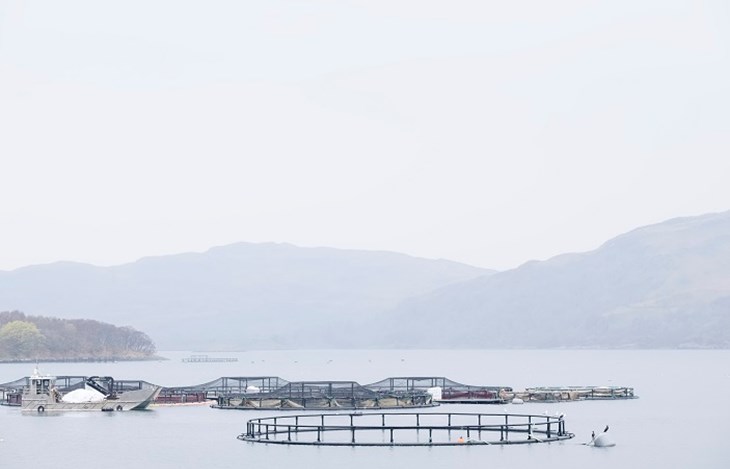Published 01/07/2019

A new report published today (1st July) by environmental campaign group Feedback, shines a spotlight on the Scottish salmon industry’s hidden appetite for wild fish.
Cruel and wasteful
Millions of tonnes of fish are being harvested from the wild every year to produce fishmeal and fish oil to feed fish (including salmon) reared in underwater factory farms. This hugely increases the pressure on already depleted wild fish stocks. These wild fish die without any form of humane slaughter, so the welfare costs of this feed is also massive.
“It can take hundreds of wild forage fish to produce just one farmed salmon,” said our Head of Fish Policy, Dr. Krzysztof Wojtas. “Not only is this clearly wasteful – it’s incredibly cruel as well.”
“Salmon suffer when confined in vast numbers, with nothing to do but swim listlessly in circles. And yet, tens of billions of small fish die in inhumane ways on huge industrial fishing vessels, in order to fuel the salmon kept in these underwater factory farms.”
Worrying expansion plans
The Scottish salmon industry plans to more than double in size over the next decade.
Based on current projections, Feedback estimates that to fuel this growth, the industry will need to source an additional 310,000 tonnes of wild fish per year to make into salmon feed.
While some fisheries sourcing wild fish for salmon feed are certified by the Marine Stewardship Council, many are not, or rely on schemes that certify fishmeal and fish oil manufacturers, rather than the source fisheries themselves.
Krzysztof continued: “It is deeply worrying that the industry expansion has not been stopped in its tracks, considering the huge environmental and welfare concerns. Transparent information about the industry feed supply should be an absolute obligation of this industry.”
We can’t have our fish and eat it
Dr Karen Luyckx, Head of Research at Feedback, added: “The simple reality is that we cannot have our fish and eat it – feeding limited stocks of wild fish to farmed salmon is neither an efficient nor sustainable way to produce protein.
“The Scottish salmon industry may like to sell itself as producing healthy and responsible food in a uniquely Scottish wild environment, but with the companies largely Norwegian-owned and the feed coming from all over the globe, the most Scottish part of the industry is the waters these farms pollute and the landscapes they blight.”
Take action
We are supporting Feedback’s call for the Scottish salmon industry to publish full and transparent information about its feed supply chain, including where it is sourcing wild fish, what types of fish it uses, and what proportion of its marine ingredients come from by-catch or trimmings from human edible fish.
You can find out more information about the impacts of using wild-caught fish to feed farmed fish, here.
